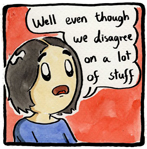|
If the pandemic taught us anything, it is a drinking bird could be a better admin than a lot of the ones we have in schools already
|
|
|
|

|
| # ? Jun 8, 2024 14:06 |
|
500 bad dogs posted:lol your serious arent you that guys gimmick is being wrong about everything
|
|
|
|
Al! posted:this is a common phrase encouraged in academia by tenured professors to keep the workers from unionizing. in one college i worked for, the adjuncts (the real teachers) were in the same union as the administrators and it was a good thing for all involved. if you're talking the heads of the college like the deans, yeah i agree as far as i can tell that's a very special place if it allows adjuncts to be union members and/or benefit from CBAs. but i also just have to hard disagree: the administrative bloat in education, K-PhD, is a real problem. not necessarily the most urgent and definitely not so in every instance. but it's real fuckin bad. and yeah, that money should be put to better use like funding real positions for adjuncts and then outlawing the use of the adjuncting model, etc. any tenured/tt faculty that oppose adjunct relief are the enemy. intuitively/from experience i'd guess that most of the opposed tenured faculty are nth-generation professorial legacy bourgeois trash
|
|
|
|
Nonsense posted:Public Schools = Military Schools, it's time. service guarantees citizenship
|
|
|
|
FlapYoJacks posted:I took electronics as an elective at my vo-tech senior year and it turned me into a degenerate professional computer toucher. My high school had a variety of very hands-on computer classes. I met my best friend in a computer repair class where we got all up in the guts of some old desktops and it laid the foundation for us to build our own gaming PCs, so probably a net-negative. The same teacher though also taught like architecture and autoCAD, so it was kind of our bougie version of shop. It was a mix of computer nerds and the traditional vo-tech cohort of non-college-track kids and while he definitely treated people differently based on their track and you basically got what you put into it, it was overall a safe space. I'm sure some kids picked up skills at drafting that wouldn't otherwise. As one of the nerds, it also had good knock-on effects of letting me make friends with kids that probably otherwise would have treated me like poo poo. I imagine literal computer touching is as passe as shop now though.
|
|
|
|
captainbananas posted:as far as i can tell that's a very special place if it allows adjuncts to be union members and/or benefit from CBAs. but i also just have to hard disagree: the administrative bloat in education, K-PhD, is a real problem. not necessarily the most urgent and definitely not so in every instance. but it's real fuckin bad. nah even the admins get paid nothing and the bloat described usually looks like dire understaffing for underpaid workers. the real real problem is the foundations, which have just millions sitting in them for use as a slush fund by the college board. ever wonder why a college could be in a budget freeze yet somehow build multi-million dollar capital projects? well investing in people doesnt make money for the foundation (and therefore the board), but investing in real estate does
|
|
|
|
its classic capitalist "the reason we cant pay you is because these other workers over there are making too much money" division feeding.
|
|
|
|
Al! posted:nah even the admins get paid nothing and the bloat described usually looks like dire understaffing for underpaid workers. the real real problem is the foundations, which have just millions sitting in them for use as a slush fund by the college board. ever wonder why a college could be in a budget freeze yet somehow build multi-million dollar capital projects? well investing in people doesnt make money for the foundation (and therefore the board), but investing in real estate does
|
|
|
|
Okuteru posted:If the pandemic taught us anything, it is a drinking bird could be a better admin than a lot of the ones we have in schools already My school has 3 administrators. They hate being at the school so much that they rotate, 2 off while 1 is at the school. Al! posted:nah even the admins get paid nothing These admins are making quintuple what I make as a teacher with a master's. I really wish I could sneak into our school system's HR department and look at personnel. I get the feeling that we have a lot more non-classroom staff than normal. There's a lot of PHDs in charge of a lot of things it seems. spacetoaster has issued a correction as of 20:20 on Dec 4, 2023 |
|
|
|
introduce microsoft-style stack and sack performance management for schools every year, each grade level for the entire district ranks all children. get 5% that get an A, 20% that get a b, 40% that get a C, 20% that get a D, 10% that get a D- and have their eyeballs glued open clockwork orange style at summer school, and the worst 5% are sent to prison
|
|
|
|
believe me if you win your crusade to pay the admins less the college will be happy to take those savings and reinvest them into the foundation
|
|
|
|
i mean you might want to ask yourself why a tenured professor who doesnt need to teach or publish anymore is making more than the college president before you wonder where all that departmental salary budget goes but ultimately trying to balance the pay division between administrative laborers and academic laborers within a college system is the wrong question. the only thing that will solve it is a card check on both sides
|
|
|
|
I work in a public elementary school. I didn't realize we were talking about colleges.
|
|
|
|
Arglebargle III posted:Nothing is going to work until schools start enforcing attendance and discipline again. A dual track system would help a lot as getting rid of the bottom 20% of the school would help reduce teacher and admin workloads enormously. But until you build up the institutions around enforcing attendance laws and removing violent or non-compliant kids from the room, teacher and admin workloads will remain insurmountable. Gonna engage with this post in good faith because beyond idea of "getting rid of the bottom 20%," I think it actually hits on an interesting confluence of issues, even if the proposed solution has been thread-titled. To give some context: let's start with the standard of the least restrictive environment, a legal standard that came into being with the Individuals with Disabilities Education Act. What that standard stipulates is that any student with individualized learning needs should be placed in the environment that meets their needs that is as close to a general education classroom as possible . This is an objectively good and necessary thing; without it, it's really easy to just "get rid of" any student who is inconvenient by shuffling them off into a separate classroom that does not provide them with an appropriate education and calling it a day. I'm not arguing against the standard of the least restrictive environment, and no good educator would. It's been the guiding philosophy of how we separate or don't separate kids since 1990 and was literally one of the first things I learned in my education program. To accommodate this standard, a lot of pressure has been put on teachers to make learning as accessible as possible to all students. Again, objectively a good thing. Practices like universal design are bog-standard for teacher training and anyone who's been in the game for less than 20 years is more or less accustomed to teaching in a way that meets a lot of different learning styles. This makes the curriculum more accessible to more students, which benefits everyone, but particularly benefits the students who need those accommodations things to thrive. The basic notion is that it is incumbent on the teacher to make learning accessible to all students. A fine ideal, and one that I don't disagree with. But what happens when that ideal gets combined with the political and economic realities that surround it? To list off a few things that seem relevant: -No Child Left Behind and Race to the Top establish non-negotiable English, math, and science standards: the number of credits students need to take in these areas is made uniform, and the assessment of those standards is linked to standardized tests -COVID-19 fucks everything up in every loving conceivable way. Learning loss, physical and mental health, social regulation, technology addiction, gently caress. -Budgets do not keep up with costs, creating an incentive for administrators to cut expensive programs and find cheaper solutions (that often aren't as good) -Social welfare and support systems outside of school are cut, putting more and more pressure on schools to cover the gap -Consistent demonization of teachers as lazy, uncaring, untrained, etc. What essentially results is the notion that a student cannot fail, only be failed. Which is fine, if not for the fact that we have actual standards of failure and a strong incentive to push kids along rather than actually stop and look at what's holding them back. If a student is not thriving in what has been determined to be their least restrictive environment (by administrators who have incentive to keep the student in a cheaper general ed classroom; why pay for an expensive out of school placement when you can throw a TA in English 101 and call it a day?), it must be the teacher's fault. A standard section of 10th grade English in my school this year has roughly 25 students. About a third of them have intense individual accommodations that a teacher is expected to enact without support. Two or three others just immigrated to the country and don't speak English at all. All of those students are taking the standardized test 15 weeks from now. And once or twice a week, a student from outside of the class will bang on the window threatening students in the class and will not leave. Repeated restorative justice practices between that student and the student being threatened have yielded no results, but because of a recent state law, the student making the threats cannot be suspended: she has a documented disability that relates to the outbursts, and therefore she cannot be disciplined for it without following an onerous process that the administrator is not willing to follow. The remaining 20 or are multiple grades behind on reading. Their performance reflects on you as a teacher. And you can't go answer their questions because the one kid at the window is still causing a scene. Any time you hear a teacher say anything like the original post, the situation I've described above is what's causing it. You can call it burnout, lovely teaching, whatever, but it is a reality than many teachers are facing. Budgeting, idealism, and standardization have decided that the general education classroom needs to work for every student, and now every classroom has every student; but class sizes, support systems, and resources have not evolved in a way that allows teachers to individualize instruction for so many different types of learners in a single environment. It's an impossible tasks and you're constantly told if you're not doing it you're neglecting your professional and ethical responsibilities. Things that might actually improve these areas without totally writing off kids include: -Figuring out how to offer more variety of structure and specialization within the public schools: charters rightfully get a lot of flack, but there is some evidence that their ability to meaningfully reimagine the fundamental structure of school can be beneficial. Vocational schools are highly successful. We need to expand on that model and provide more options and approaches for students. -Destigmatizing holding kids back: there's a ton of administrative, social, and parental pressure to avoid failing grades. Rethinking how grades work and actually admitting it's okay for students to move at different paces rather than insisting both the pace and the environment must be exactly the same for everyone would take a lot of the system-wide pressure off. -Give teachers class sizes and solo/collaborative prep time that allows them to individualize within a general education setting. If I got syq-ed into half-justifying some lovely reddit post and am gonna be the next thread title so be it. I do think a lot of teachers, though, whether we'd want to admit it or not, share in the frustrations it expresses. motherbox has issued a correction as of 00:29 on Dec 5, 2023 |
|
|
|
spacetoaster posted:My school has 3 administrators. They hate being at the school so much that they rotate, 2 off while 1 is at the school. It really was a shock when I found out how much the administrators make in one of the districts I work in. The board office has new furniture, carpet, and air conditioning and the school across the street has a bare concrete floor. Not good!
|
|
|
|
motherbox posted:Gonna engage with this post in good faith because beyond idea of "getting rid of the bottom 20%," I think it actually hits on an interesting confluence of issues, even if the proposed solution has been thread-titled. I think a lot of it is staffing too. My school is at 50% of its certified teaching staff. We just hope subs will show up (they mostly don't), and when they don't I double my class size with random students from other classes. This isn't even getting into the fact that there are many classes that just have a sub every day. Every. Day. Not even the same sub. Whatever sub shows up and will sit in a room with them. Our system doubled the substitute pay, but it still won't get people to come into this environment and stay. https://www.cbsnews.com/news/substitute-teacher-shortage-living-wage/ spacetoaster has issued a correction as of 00:26 on Dec 5, 2023 |
|
|
|
Al! posted:i mean you might want to ask yourself why a tenured professor who doesnt need to teach or publish anymore is making more than the college president before you wonder where all that departmental salary budget goes but ultimately trying to balance the pay division between administrative laborers and academic laborers within a college system is the wrong question. the only thing that will solve it is a card check on both sides we're talking about principals and superintendents
|
|
|
|
Al! posted:nah even the admins get paid nothing and the bloat described usually looks like dire understaffing for underpaid workers. the real real problem is the foundations, which have just millions sitting in them for use as a slush fund by the college board. ever wonder why a college could be in a budget freeze yet somehow build multi-million dollar capital projects? well investing in people doesnt make money for the foundation (and therefore the board), but investing in real estate does Dianne Feinstein's husband Richard Bloom was a regent of the University of California and has a direct quote about investing in teaching instead of research facilities not having good ROI and thus not worth it. Can't find it anywhere since he was also literally an investment banker so he used those words a lot. Lol.
|
|
|
|
I *did* however manage to find an NYRB article I'd been searching for that I thought this thread would appreciate. It's about a method of teaching kids to read that gained popularity in the 90s but apparently doesn't work well but it still sticks around because education funding isn't about what works https://www.nybooks.com/articles/2023/02/09/misreading-the-cues-sold-a-story-emily-hanford/ Not sure if it's behind paywall so here ya go: quote:One night, while searching in the woods for food, Frankenstein’s monster discovers a leather suitcase containing three books: The Sorrows of Young Werther, Plutarch’s Lives, and Paradise Lost. Goethe is a source of “astonishment” but also alienation; the monster can sympathize with the characters, but only to a point—their lives are so unlike his own. From Plutarch he learns about public virtue. It is Milton who expands his soul. Paradise Lost “moved every feeling of wonder and awe,” the monster says. As a created being, he identifies with Adam, but Satan is “the fitter emblem of my condition, for…when I viewed the bliss of my protectors, the bitter gall of envy rose within me.”
|
|
|
|
I’m a middle of the pack Millenial and I don’t remember many kids needing a helper/aide when I was going, but hear about it all the time now (mostly in the context of aides are needed but there aren’t any). When I was younger, were these kids just shuttled off to a back room, and that is no longer legal, or are there straight up more kids with learning disabilities these days? I also always hear about kids acting out and no consequences. What changed with consequences/discipline since past generations? Thanks I’ll take my answers off air
|
|
|
|
I'm curious how they teach kids to read in China since it's not obvious that phonics would be beneficial at all for logographic writing. Do they just learn pinyin and then hanzi when they're older or is there some other system that works for them?
|
|
|
|
spacetoaster posted:These admins are making quintuple what I make as a teacher with a master's. When I worked in education I was district IT (technically part of the admin union) without a college degree and I made more with a high school diploma than any teacher's starting pay in our highly competitive district. My office was in an adult ed school because that's where there was space for the district's IT department, and the director for that school made around ~$150k and retired with a six-figure pension. The program coordinator (technically below the director's position) for ESL made substantially more money. Adult ed was also widely considered the dregs where your career went to die. Anyway, ESL teachers in that school were all part-time and made like $20/hour and could just be straight up sent home for the day with no pay if not enough students showed up to their class.
|
|
|
|
The Oldest Man posted:introduce microsoft-style stack and sack performance management for schools School's supposed to be about preparing kids for the workforce and not for actually educating them, right? Might as well get 'em used to bullshit arbitrary performance assessments early.
|
|
|
|
Fortaleza posted:I'm curious how they teach kids to read in China since it's not obvious that phonics would be beneficial at all for logographic writing. Do they just learn pinyin and then hanzi when they're older or is there some other system that works for them? Rote memorization of phonics.
|
|
|
|
Fortaleza posted:I *did* however manage to find an NYRB article I'd been searching for that I thought this thread would appreciate. It's about a method of teaching kids to read that gained popularity in the 90s but apparently doesn't work well but it still sticks around because education funding isn't about what works i've talked to other parents about this a funny thing about when cueing comes up is that people sometimes misunderstand it - like, the three cueing strategies are what a lot of people, myself included, use when trying to figure out the meaning of a word. but! this is a misunderstanding, because we aren't talking about strategies for decoding meaning, but a strategy for reading the word itself. like if you came across the word jentacular (a word i just googled) using context to infer its meaning is great. but using context to try to figure out the word is, instead of just reading/deciphering the letters, is going to be impossible.
|
|
|
|
Crazyweasel posted:I also always hear about kids acting out and no consequences. What changed with consequences/discipline since past generations? At my school the admins want it to all be handled by the teacher. Usually they will say to me: "Well Spacetoaster, make sure they have a consequence and be consistent." Which is difficult when the behavior is sexual assault, sending kids to the ER with concussions and gashed open heads, full on multi person brawls, guns brought to school, etc, etc. I don't actually know why a specific admin may be against doing anything, but I have an idea. 1. Any action by an admin to punish a child is tracked (that's bad metrics for the admin on an evaluation) 2. Any action by an admin to punish a child is publicized (the bosses downtown may get mad and yell at you) 3. It's hard dealing with angry parents, especially if you're a pushover when it comes to people you don't control There's probably more, but I get the sense that the admins at my school just want to look good in front of their bosses/peers, are scared to make hard decisions, and don't like confrontation. We had a dad physically threaten one of our 1st grade teachers and the admin had the teacher leave the area rather than tell the dad to get off school property. Anything to avoid a "problem". spacetoaster has issued a correction as of 14:55 on Dec 5, 2023 |
|
|
|
speaking as someone in Scotland who experienced phonics in primary school, it always seemed incredibly boring and pointless to me, but only because I was a hyperlexic idiot and I could read on my own when I was three years old. I didn't realise until a few years ago that the vast majority of my peers didn't know how to read, and practicing lessons in what was then called 'Sounds' (maybe it still is in Scottish schools? idk) was how they learned to read. I would've loved 'literacy by vibes', but I probably would've been the only one, and in hindsight I'm glad that it didn't happen like that. Anyway, from what I've been seeing itt and on Twitter and that, education in the US sounds like a complete loving shitshow. I seriously empathise. Obviously the end goal is to push living standards for the working class back to the Victorian era, making the populace uneducated, illiterate, and completely subsumed by capital, and clearly the pandemic up to now has just accelerated that push by loving over teachers in particular. I don't know why anyone would want to go into education now. e: oh yeah, just remembered, we specifically also had a phonics thing called Letterland in my first couple of years of primary school. Again, it didn't do much good for me, but I'm pretty sure it helped a lot of my peers in particular. Venomous has issued a correction as of 15:53 on Dec 5, 2023 |
|
|
|
spacetoaster posted:At my school the admins want it to all be handled by the teacher. Usually they will say to me: "Well Spacetoaster, make sure they have a consequence and be consistent." That just sounds like your average admin, really.
|
|
|
|
Fortaleza posted:I'm curious how they teach kids to read in China since it's not obvious that phonics would be beneficial at all for logographic writing. Do they just learn pinyin and then hanzi when they're older or is there some other system that works for them? they teach them pinyin and how to write the characters from pretty early on. rote memorization of how to read out the characters and practice writing by hand with books like these   and then you can start moving onto actual picture books with pinyin alongside the characters  and then picture books without pinyin (sometimes they will include the pinyin for new characters or ones otherwise a bit beyond the level of the book)  and then by the time you're 8 years old they apparently have you on this book (i found this in the bedroom of an 8 year old daughter of some relatives, shes learning it at school this year???)  
|
|
|
|
lobster shirt posted:the word jentacular (a word i just googled) this is violence when I haven't even had breakfast yet
|
|
|
|
Okuteru posted:That just sounds like your average admin, really. Yeah.
|
|
|
|
fart simpson posted:
lol
|
|
|
|
jelqtacular
|
|
|
|
ok but what’s with the mealworms
|
|
|
|
Kreeblah posted:School's supposed to be about preparing kids for the workforce and not for actually educating them, right? Might as well get 'em used to bullshit arbitrary performance assessments early. If they truly want to prepare kids for the workforce they would give them all Cs. And then when the kids challenge them on it say, "Sorry, we're not allowed to give anyone higher than a C this year." And then give As to the narcs.
|
|
|
|
Chad Sexington posted:If they truly want to prepare kids for the workforce they would give them all Cs. And then when the kids challenge them on it say, "Sorry, we're not allowed to give anyone higher than a C this year." We aren't allowed to give any kids a grade less than 50. Even if they turn in nothing. And the admins will absolutely go change grades if you fail them. How is violence in ya'll's schools? We had a boy break the math teacher's arm recently.
|
|
|
|
A bright future in the octagon
|
|
|
|
spacetoaster posted:We aren't allowed to give any kids a grade less than 50. Even if they turn in nothing. Standardized test grading is the same way. If the school isn't getting the passing percentage number they want they complain to the company that grades the tests and they change how the essay part is scored until number go up.
|
|
|
|
Kreeblah posted:School's supposed to be about preparing kids for the workforce and not for actually educating them, right? Might as well get 'em used to bullshit arbitrary performance assessments early. John Taylor Gatto, a teacher turned Education critic, came up this exact conclusion. Then it turned out he is just a libertarian.
|
|
|
|

|
| # ? Jun 8, 2024 14:06 |
|
were the kids okay
|
|
|
















































